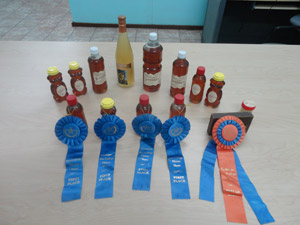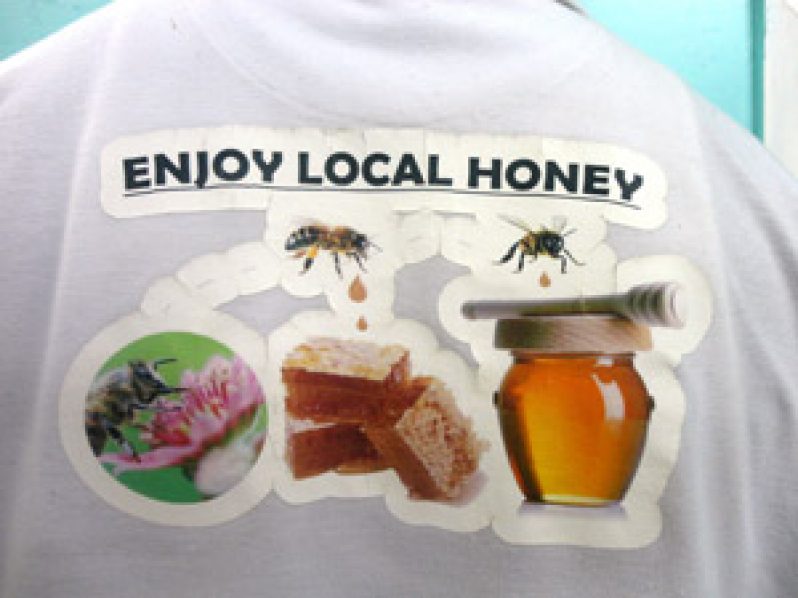IN the United States of America, the United Kingdom and other countries where the disappearance of bees has become a major problem, beekeepers are trying their utmost to keep their bees alive.
 On the other hand, here in Guyana, where we do not have such a problem, there are people who are trying their darnedest to get a chance to kill our bees.
On the other hand, here in Guyana, where we do not have such a problem, there are people who are trying their darnedest to get a chance to kill our bees.
So says President of the Guyana Apicultural Society, Linden Stewart, who sees the latter move as a recipe for disaster, and who is of the view that an aggressive education campaign on bees should be conducted countrywide.
With this in mind, the Association is urging the nation to revolutionize its approach towards honey bees, and not harm or treat them with hostility, or we run the risk of losing them, and ultimately humanity.
Calling for the destruction of bees could only be attributed to a local lack of knowledge of the importance of the insects, Stewart said. Of the more than 2,000 varieties of bees in Guyana, the Africanized bees have proven to be the most aggressive, and upon being disturbed, have fatally stung and otherwise injured several persons, domestic animals and pets.
Consequently, there is an immediate attitude of repulsion whenever the term ‘Africanized Bees’ is mentioned in some quarters, to the extent that some people feel the bees should be destroyed when found.
But whilst being sympathetic to the deaths and injuries caused to persons and animals, destruction of the insects is not the answer to the problem, Stewart argues. He noted that that course of action can have far reaching consequences for the world at large.
The importance of bees
Keeping bee populations safe is critical, he said, since bees are pollinators, and one of their primary functions is to transfer pollen and seeds from one flower to another, which is known as fertilization. Cross-fertilization allows plants to  grow and produce food, and helps propagate at least one-third of the world’s crops. Unless safeguarded, the bees can eventually disappear, with the end result being that much needed agricultural crops will disappear as well.
grow and produce food, and helps propagate at least one-third of the world’s crops. Unless safeguarded, the bees can eventually disappear, with the end result being that much needed agricultural crops will disappear as well.
Other known pollinators are birds, bats, beetles and butterflies; but in addition to cross fertilizing plants and flowers, bees also produce honey, from which several other products are made. These include: wines, candles, pharmaceuticals, medicated soaps, and cosmetics such as lipstick, among other things.
A recent news report coming out of Forbes magazine puts it this way, “Birds, bats and insects all pollinate flowering plants, but the most celebrated pollinator is the honey bee, and for good reason…”
The disappearing bee
Bee species are reportedly declining in many countries of the world, including Britain, the Netherlands, Spain and the USA. This has heralded a concomitant decline in the number of wildflowers that depend on bees to pollinate them. This development is attributed to a phenomenon known as Colony Collapse Disorder, (CCD), wherein healthy bees abandon their hives en masse and never return. About one-third of all honey bee colonies in the USA has vanished.
“If bees continue to die off, so would the crops they support; and with that would ensue major economic disruption, and possibly famine,” a March 2013 edition of Target Health Global said.
A report from the National Resources Defense Council (NRDC) of the USA states that honey bees are disappearing across the country [US], thus putting $15 billion worth of fruits, nuts and vegetables at risk. This alarm was first sounded in 2006, and researchers produced an extremely detailed list of the crops that simply won’t grow without honey bees to cross pollinate them. Some of the crops named are very common in the Guyanese diet. They include apples, citrus, cherries, berries, peaches, pears, plums, avocadoes, mangoes, water melons, peanuts, bananas, squashes, carrots, cucumbers, pumpkins, celery, onions, soy beans and legume seeds.
The NRDC has given the following reasons for disappearance of bees:
• Global warming. This has caused flowers to bloom earlier or later than usual. When pollinators come out of hibernation, the flowers that provide the food they need to start the season have already bloomed
• Pesticide use on farms. Some toxic pesticides that are meant to kill pests can harm the honey bees which are needed for pollination.
• Habitat loss. This is brought about by the development whereby people grow flowers that are not friendly to pollinators, and farms are abandoned without leaving habitat for wildlife.
• Parasites, such as harmful mites.
But Colony Collapse Disorder is mainly attributed to destruction of the honey bees through the use of pesticides. Hence agricultural food production in the United States could be in jeopardy in the not-too-distant future if honey bees continue to disappear.
Guyana is, so far, fortunate not to have a problem with migratory bee keeping or bees dying. In fact, in July 2008, Guyana was certified as being ‘Disease and Pest Free’. A Diagnostic Professor, Mr. Clive D.E. Brain, was sent here from London along with the President of the Caribbean Bee Keeping Association, Mr. Gladstone Solomon, to do the diagnosis. The two men toured the country extensively and came up with their findings.
Another plus for this country is that it is reputed to have the best honey in the Caribbean. In January 2003, Guyana attended the Caribbean Bee College Honey Show and clinched five first prizes in the following categories:
* Best Viscosity (the lowest moisture content in its honey)
* Best Tasting Honey
* Best Shade of Honey (in terms of colour)
* The only Indigenous Flavoured Honey and
* Best Overall in the Categories
Additionally, Guyana won two second place prizes for Best Packaging, and a third place prize for ‘Darkest Shade’ Honey.
But even though Guyana does not have a bee migratory problem, and our bees are not dying out, local beekeepers are, out of abundant caution, on guard and treading cautiously. To this end, the Guyana Apicultural Society (GAS) is making every effort to up the ante and take the sensitization campaign across the country, so as to ensure that Guyanese come on board in helping to save the bees, and ultimately humanity.
Stewart said the bees are not aggressive when not disturbed; but being very territorial, and highly protective of their Queen, when disturbed, they impulsively move to defend their territory, their queen and their home.



.jpg)








